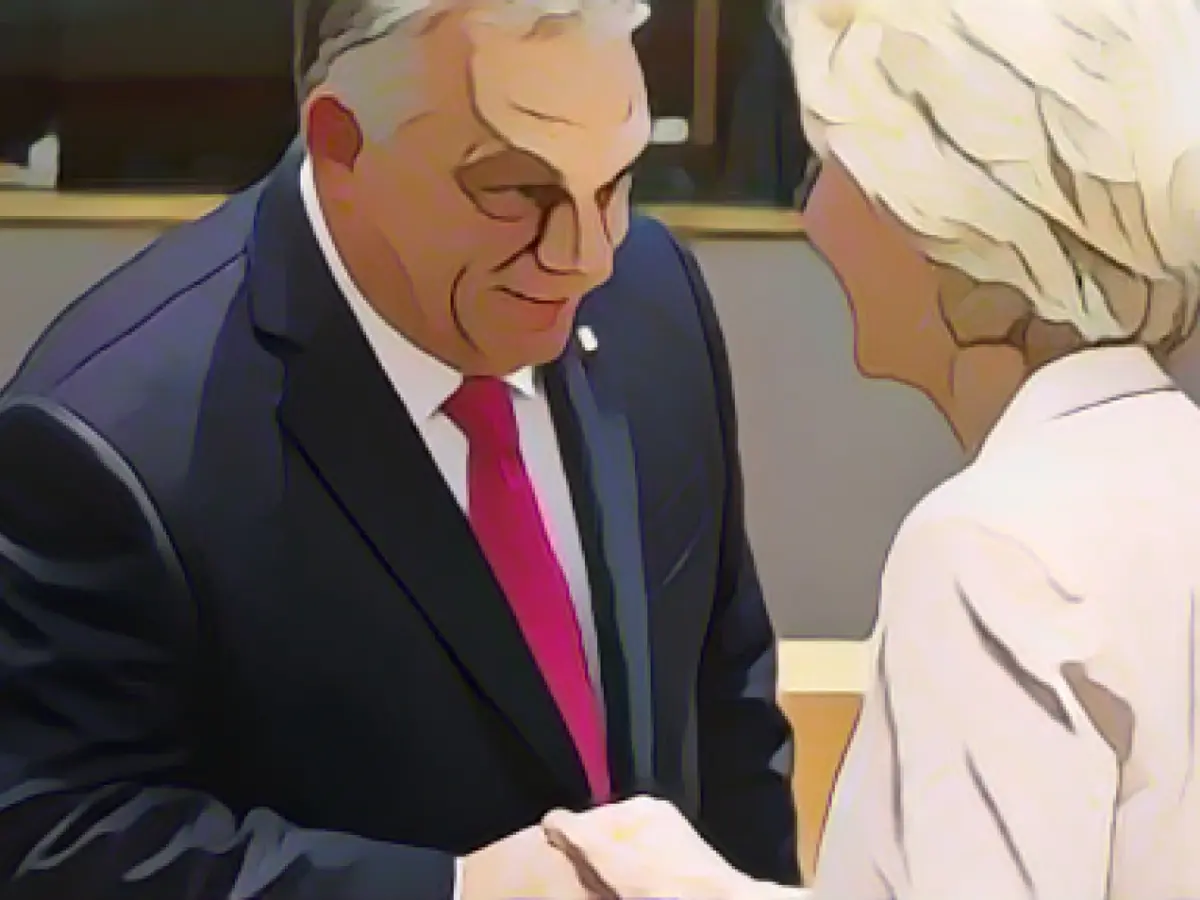Criticism of "deal": EU Commission releases ten billion euros for Hungary
From Thursday, the pre-Christmas summit of European heads of state and government will discuss further billions in aid for Ukraine and the start of accession talks with Kiev. However, Orban has so far blocked the plans. Critics accuse the right-wing populist of "blackmail" because he has also demanded money back from the EU.
The Commission has now declared that Hungary has implemented the required measures for the independence of its judiciary. As a result, "cohesion policy funds are no longer blocked" and Hungary can "claim reimbursements of up to around 10.2 billion euros". This is almost half of the 21.7 billion euros that the EU froze in the dispute with Orban.
There was sharp cross-party criticism from the European Parliament: MEP Daniel Freund (Greens) spoke of a "catastrophic signal". EU Commission President Ursula von der Leyen is paying "the biggest bribe in EU history to the autocrat and Putin friend Viktor Orban", Freund wrote on the short message service X, formerly Twitter.
FDP MEP Moritz Körner wrote that von der Leyen was sacrificing democracy in Hungary to save democracy in Ukraine. "So far, Hungary has only delivered reforms on paper, and even that is not enough."
"The Commission could not have released the funds at a worse time," also criticized CSU politician Monika Hohlmeier, who chairs the Budgetary Control Committee in the European Parliament. It should be clear to everyone that the ten billion euros ended up in the hands of Orban's confidants in his Fidesz party and oligarchs loyal to the government.
The four large political groups in the EU Parliament had tried unsuccessfully to dissuade von der Leyen from the decision. In a speech in Strasbourg, however, she made it clear that the planned 50 billion euros in aid for Ukraine was her priority. The Commission alone decides on the release of funds and the member states can no longer prevent this.
In any case, the EU states have so far been reluctant to criticize. Luxembourg was an exception. Foreign Minister Xavier Bettel had previously warned that if Hungary lifted its veto and received so much money in return, it would look like a "deal" that would certainly not strengthen citizens' trust in Europe. "That doesn't smell good," Bettel emphasized. German government circles, on the other hand, said that von der Leyen enjoyed Berlin's "fullest confidence".
Last year, the EU initiated rule of law proceedings against Hungary for the first time on suspicion of misappropriation of European budget funds and put further billions on hold. Budapest is also at loggerheads with Brussels over other violations of fundamental rights, such as the rights of asylum seekers, sexual minorities and academics.
Chancellor Olaf Scholz (SPD) addressed Hungary's resistance in his government statement on the EU summit in the Bundestag. According to his own words, he wants to make a strong case at the summit for both aid for Ukraine and accession negotiations with Kiev.
Read also:
- This will change in December
- German activists speak out in Dubai on suffering in Israel and the Gaza Strip
- Despite UN vote: fighting between Israel and Hamas in the Gaza Strip continues
- Nuclear fusion - hype or solution to energy problems?
- Despite the criticism towards the "deal," the EU Commission has allocated a substantial 10.2 billion euros for Hungary, opening the way for potential reimbursements.
- The European Parliament strongly condemned the decision, with Daniel Freund (Greens) labeling it as a "catastrophic signal" and a "bribe" to Hungarian Prime Minister Viktor Orban.
- FDP MEP Moritz Körner accused EU Commission President Ursula von der Leyen of sacrificing democracy in Hungary to save democracy in Ukraine, arguing that reforms in Hungary have only been carried out on paper.
- CSU politician Monika Hohlmeier, who chairs the Budgetary Control Committee in the European Parliament, criticized the timing of the release of funds, suggesting that the money could end up in the hands of Orban's affiliates and loyal oligarchs.
- The four large political groups in the EU Parliament attempted to persuade von der Leyen against the decision, but she remained steadfast, prioritizing the planned 50 billion euros in aid for Ukraine.
- Luxembourg, however, broke the silence by warning that if Hungary lifted its veto and received such a large sum of money, it would be perceived as a "deal" that would not strengthen citizens' trust in Europe.
- German government circles, on the other hand, expressed confidence in von der Leyen, highlighting her commitment to providing aid for Ukraine and overseeing accession talks with Kiev.
- Last year, the EU initiated rule of law proceedings against Hungary due to suspicions of misappropriation of European budget funds and held further funds in reserve.
- Budapest is entangled in conflicts with Brussels over a range of violations of fundamental rights, including the rights of asylum seekers, sexual minorities, and academics.
- Chancellor Olaf Scholz (SPD) emphasized his intention to advocate strongly for aid for Ukraine and accession negotiations with Kiev at the EU summit, addressing Hungary's resistance to these efforts.
Source: www.stern.de







